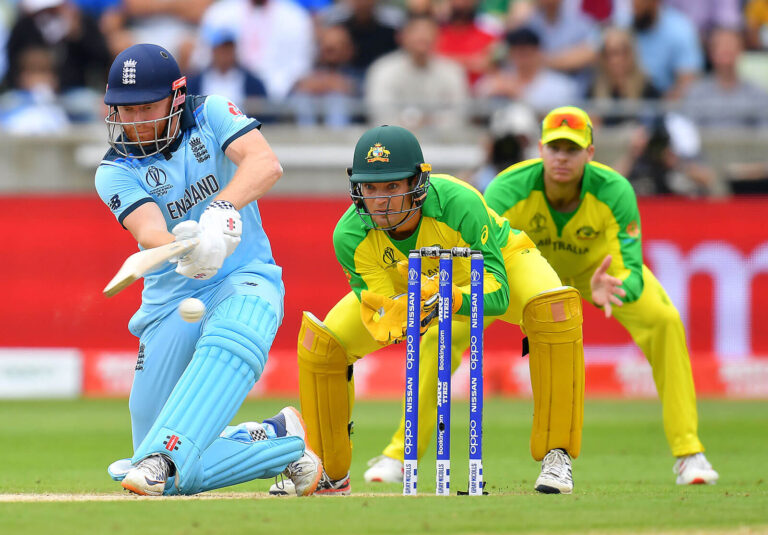When tournaments are finally won, the victors often talk of relief. Relief that they have met, or exceeded, expectations, relief that they have got over the line. Relief, above all, that they will not have to live with the agony of defeat. Amid the happiness and excitement generated by England’s remarkable World Cup victory at Lord’s on Sunday, there is a palpable sense that the whole team, as well as the ECB, are relieved that four years of hard work has been rewarded with the ultimate prize. The alternative would have been unthinkable.
Beginning this tournament as favourites, with home advantage, and having swept aside most of their opponents since the last World Cup, the pressure was on England over the past seven weeks. A nation expected. Had they been unable to win the tournament, their best chance in a generation, plenty of questions would have been asked about Eoin Morgan’s team and the value of the progress they had made since their capitulation in Australia in 2015. Too fickle? Maybe. But it’s also the reality.
Those questions will never be asked of this team now. They will always be the team who won England’s first World Cup, the favourites who backed it up and delivered. It wasn’t perfect – far from it – but they beat India, Australia and New Zealand twice, the three other best teams, in what were effectively four consecutive knock-out games. They are worthy winners.
“It’s terribly exciting and justification for how we went about it for the last four years,” head coach Trevor Bayliss, who finally won a final after three previous unsuccessful attempts as a coach, said at The Oval on Monday. “At different times we have copped a bit of criticism for the way we went about it. But we had an end goal in mind and this is the result. I am one from four now so I am quite happy with at least getting one.
“To see the joy on the boys faces yesterday and to see the way they celebrated in the dressing room was all worth it.”
It was fitting, in a way, that England’s journey started four years ago in a series against New Zealand, the team they beat in yesterday’s final. Five brilliant matches in the early summer of 2015 showcased, for the first time, the bold style that is now the hallmark of this England team. They won the series 3-2 and started in style by making 408 in the first ODI. They chased 350 within 44 overs at Trent Bridge in the fourth game. They scored more than 300 in the first four matches. It was a revelation.
It was also a key moment in the development of this team, a line drawn under what had gone before and a radical change of approach initiated. That series was, Joe Root said, when the team started to believe they might be able to do something special in one-day cricket. “The way we performed throughout that series, the way Morgs laid things out and gave the guys opportunity to go and express themselves and play in that manner,” he said at the Oval.
“And seeing us do it and adapt to it so quickly obviously meant that we were good enough to do it. But it’s obviously a long road form there to continue to do it and look to improve be more consistent and grow as a team. It’s been such a fun journey these last four years.”
England have had their moments during that time, of course. They disappointingly lost in the semi-final of the Champions Trophy in 2017. They suffered thrashings against South Africa at Lord’s, against Australia in Adelaide and in Colombo against Sri Lanka, all on surfaces which did a bit. They lost other games too, including three in the group stages of the World Cup. But after each setback, England responded.
“The main plan was to let them go out and test the ceiling of how good they could be,” Bayliss said.”We knew they were going to stuff up. We knew they would lose games and probably lose some games badly but you only get better from making mistakes and seeing how well you can play. Learn from those mistakes with a period of four years to get it right. The talent of the team was obvious very early on.”
And all that talk of fault lines on tricky pitches can be put to bed now, too, after they emerged victorious in both the semi-final and final on surfaces which were far from the batting belters on which they dominate. Flat track bullies, yes, but far, far more than that now. “That’s the one thing I said yesterday to some of the coaching staff, that just showed how much these guys have grown over the four years,” Bayliss added.
“In one way, we have been practising for the last three and four years and learning to play on flat decks. There were games where we lost wickets and lost badly on wickets that were doing a little bit. But that’s how much they have grown. They have learnt from those bad games and been able to play some smart cricket and adjust to wickets with a little bit in them. Hopefully that’s put that to rest.”
Ben Stokes is another who might well be feeling relief after his man of the match performance. Relief that the fracas outside a Bristol nightclub two years ago will now be consigned to a footnote in any evaluation of his contribution. In danger then of throwing a career away, he is now a World Cup winner and a – the? – key reason of why his team got over the line. He has worked incredibly hard since that night in Bristol to get himself in this position. And then he delivered on the biggest stage. The narrative has certainly been changed.
“I don’t want this taken out of context but he is a real fighter,” Bayliss said. “What he did yesterday was extraordinary. You can’t stop him at practice. He wants to be involved in absolutely everything. He has a belief in his own ability and the rest of the players have a belief in his ability as well. At some stage that was going to come out and it was just set up for him beautifully.”
Was Bayliss concerned that this day, this redemption, might not come for Stokes? “Not really. The type of bloke he was, if there was one guy who could come back from that sort of adversity, he was the one. I’m really happy he was able to show what he can do on a big stage. His zest for life, he is a leader of people off the field as well and not just on it. He is a guy that a lot of people gravitate to. Everyone in the team is so happy for him.”
Stokes, Root, Bayliss. World Cup winners all of them. “It sounds pretty special, doesn’t it?” Root said. “If you’d said it four years ago, I might not have believed you. But what a journey What a tournament. What a day yesterday was







